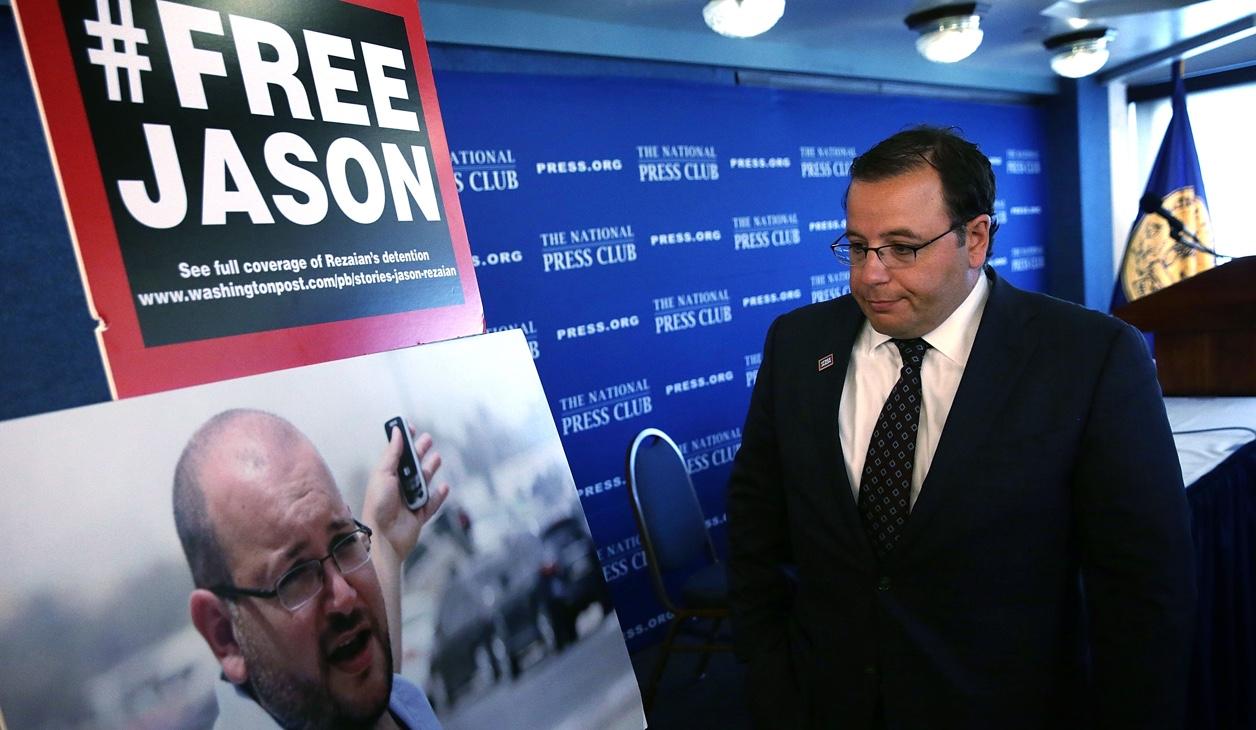Iranian court finds Washington Post reporter guilty of espionage
Ali Rezaian looks at a picture of his brother, Washington Post Tehran bureau chief Jason Rezaian, after a news conference at the National Press Club July 22, 2015 in Washington, DC.
Editor's note: This is Chatter, our morning rundown of what you need and want to know around the world. Fortunately for us all, you can have Chatter emailed to you every day. Just sign up here!
NEED TO KNOW:
Washington Post reporter Jason Rezaian, who holds both Iranian and American citizenship, has been languishing in a notorious Iranian prison now for more than 14 months.
Iran initially charged Rezaian, who has also written for GlobalPost, with espionage. But it was 10 months before the trial even began. And it took two months after it ended to hand down a verdict, which came in Sunday night as guilty.
The court has not yet revealed the sentence, but Rezaian could face 10 or even 20 years. Martin Baron, the executive editor of the Washington Post called the verdict “contemptible.”
“Jason is a victim — arrested without cause, held for months in isolation, without access to a lawyer, subjected to physical mistreatment and psychological abuse, and now convicted without basis. He has spent nearly 15 months locked up in Iran’s notorious Evin Prison, more than three times as long than any other Western journalists.”
Analysts believe Iran’s hardliners are using Rezaian as a bargaining chip. The State Department tried but failed to secure his release during the negotiations that led to the nuclear deal — a deal many hope will bring Iran out of isolation and an end to situations like this one.
Iran has recently suggested a prisoner swap. There are two Iranian-Americans now in US prisons for violating sanctions, according to the Post. One is a pastor from Boise, Idaho who was jailed for organizing home churches. The other, from Flint, Michigan, is a former Marine who has spent four years in prison since his arrest during a visit to see his grandmother.
Meanwhile, Rezaian has now been in prison longer than the 52 Americans held during the Iranian hostage crisis that began in 1979, which changed relations between the two countries forever.
WANT TO KNOW:
Austria’s refugee camps are privatized and for-profit, operated by multinational corporations. It’s a model based on the US prison system, and it's going about as well.
For the Swiss company operating Traiskirchen, a large camp just outside Vienna, more refugees means more profit. So the current crisis, driven mostly by the wars in Syria and Afghanistan, is for them less a crisis and more a windfall. The company is called ORS Service. And it also seems to understand that keeping costs low at this time is a sure-fire way to maximize profits.
At its peak in recent months, GlobalPost reports today, more than 4,600 migrants lived in the camp. It’s only meant to hold 1,800. More than 2,200 people were forced to sleep in the open, weathering rainstorms and heat waves without mattresses, blankets or any kind of shelter. Food, too, was in short supply, according to the refugees GlobalPost interviewed.
The United Nations refugee agency said the camp was “beneath human dignity.” An Austrain government official in Traiskirchen called the situation “unbearable.”
Unbearable, that is, for everyone but the Swiss corporate executives who are raking it in. In 2014, when 28,000 people claimed asylum in Austria, the government paid ORS 21 million euros ($23.7 million) for its services. This year, a staggering 52,000 requests have already been made and the year isn’t over yet.
STRANGE BUT TRUE:
Bullfighting in Spain is still a thing. Thousands of people go to bullfights, and they cheer as the bulls are essentially tortured. The bullfighters often don’t always fare all that well, either. So far this year, 10 bullfighters have been gored and killed, making it one of the deadliest years on record.
Spanish taxpayers largely fund bullfighting. But left-leaning local politicians are starting to rethink this tradition. One recently reviewed the budget and canceled subsidies for one of Spain’s most historic schools of bullfighting. The issue is divisive in Spain, however. While animal rights activists and many young Spaniards are ashamed that the archaic sport still exists, many others see bullfighting as a rich, cultural pastime.
Ultimately, though, it is anger over government subsidies that might bring bullfighting down. By some estimates, the government spends more than $780 million annually to prop up bullfighting in one way or another. That’s pretty crazy considering that Spain is only now emerging from a terrible recession that led to soaring national debt and severe unemployment.
Our coverage reaches millions each week, but only a small fraction of listeners contribute to sustain our program. We still need 224 more people to donate $100 or $10/monthly to unlock our $67,000 match. Will you help us get there today?
